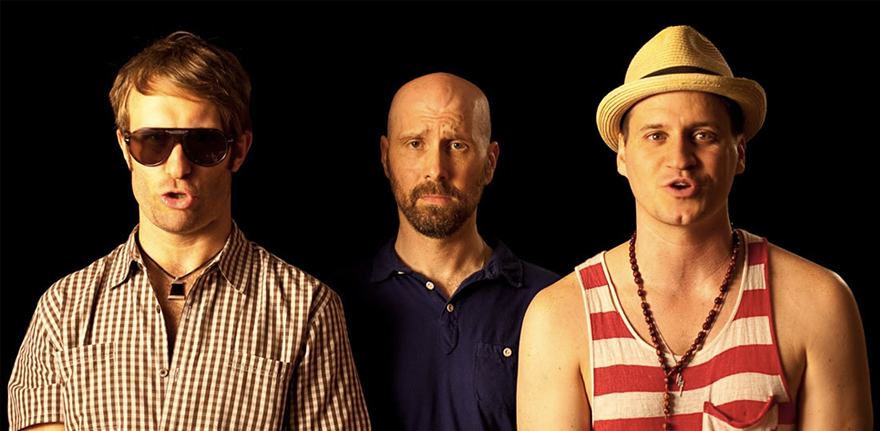
A film about gay men's voices poses an interesting question but fails to provide many interesting answers.

A film about gay men's voices poses an interesting question but fails to provide many interesting answers.
One year ago, when I first heard about writer-director David Thorpe’s upcoming documentary on the science of why gay men often have a distinctive voice, I posted the trailer to Facebook along with the entirely naive comment: “Wow, I didn’t know sounding gay was something people worried about.” A former classmate who now works in academia responded, “Oh yeah. I’ve been asked to sound less gay at work.” When pressures to sound more “straight” extend further than schoolyard bullying, even affecting a person’s livelihood, it’s clear that the otherwise clever title Do I Sound Gay? betrays a bit of anxiety as well. And Thorpe isn’t shy to confess his hatred of his own voice. Newly single and seemingly surrounded by happy gay couples as New York City legalizes gay marriage, Thorpe decides that, instead of pining for his old beau, he’s going to busy himself with a question that’s nagged him his whole life.
Thorpe, a journalist by trade, starts his documentary doing what journalists do: interviewing people. Fortunately for him, he has a lot of influential friends ready to talk to on the subject, including the popular sex columnist Dan Savage, humorist David Sedaris, George Takei, Tim Gunn, and Margaret Cho. Perhaps it’s Savage that answers my dumb question from a year ago best: “Teenagers should absolutely be concerned with how they sound, because it often leads to violence.” His commentary goes side-by-side with footage of a high school freshman getting beaten up by classmates for sounding effeminate.
The teenager, who Thorpe later interviews, lets us into his world a bit, but Thorpe himself surprisingly never lets viewers into his own life. He says he blocked out most of his childhood in the Bible belt and seems to have had a pretty liberating college experience and post-grade life in New York City. Indeed, even the interviews keep us at arm’s length. Despite the impressive catalogue of names, there are a lot of surface-level responses here about the gay experience, which seems to ignore the elephant in the room: You don’t make a documentary called Do I Sound Gay? unless there’s something traumatic about it.
The one moment of vulnerability comes when Sedaris stops with the clever turns of phrases long enough to admit: “I’m embarrassed to say this, but sometimes somebody will say ‘I didn’t know you were gay,’ and it’s like ‘why does that make me feel good?’” At times, it’s hard to not wonder whether or not some of Thorpe’s subjects might have handled the subject better, whether it’s Sedaris’ self-deprecating wit or Savage’s no-nonsense approach to sexuality. How did a film with such an interesting cast of characters end up so tame?
Thorpe’s approach seems timid and reserved. While interviews with competing professionals in the field—one that believes that we pick up speech patterns from the people we spend time with (perhaps gay men spend more time with their mothers), and one that believes we’re constantly code-switching (gay men just get confused alternating between roles)—provide something to the discussion on a journalistic level, as a piece of long-form creative nonfiction, Do I Sound Gay? just seems lacking a bit of heart. A long tangent into the history of gay voices in film, from early black-and-white pictures to Disney classics, might be interesting for a college seminar, but here seems a bit like skirting the primary issue. The argument that gay men are picking up their voices from Captain Hook and Simba’s malicious uncle Scar feels like a bit of a stretch, and it takes up too much of the film’s already short screen time.
The most fascinating question raised by the film—whether or not Thorpe’s voice actually changed when he came out of the closet, as his friends suggest—never even gets adequately addressed after it comes up. In a film that gives a fair share of time to the idea of nature versus nurture, a spontaneous change like that ought to be hashed out. Instead, Thorpe relies on humor to talk around the issue instead of talking about the issue. In most scenes actually featuring Thorpe, he’s seen performing amusing one-liners during his oratory exercises (he’s taking speech classes to sound less gay). He seems to have gained more peace with his voice by the end of the film, or at least he says as much, but it’s a shame it wasn’t more of a journey viewers could join in on. Still, credit should be given for asking a question that’s still a bit taboo to ask. Hopefully the response to the film might inspire some more illuminating answers.